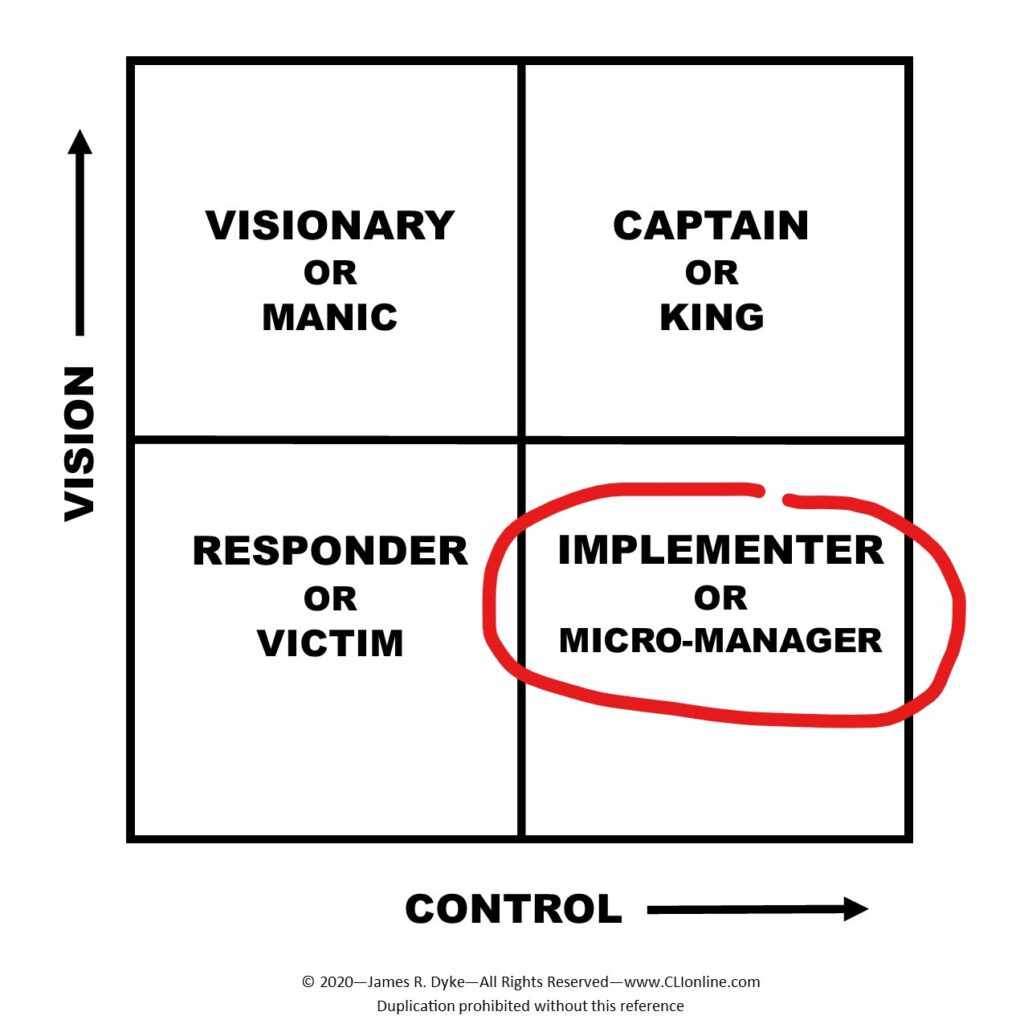Low Vision and High Control

Welcome to “hands-on” oversight and management! The Implementer is an effective manager who keeps the department or organization operating in good order, with clear processes and procedures in place and everything running smoothly. They are often detail-oriented, with a sharp eye on quality and compliance. Control is their comfort zone. They don’t like surprises—they want to live in a very predictable universe. That’s why they are quick to embrace well-defined procedures that inform and regulate their activities with precise direction. (You can’t make a mistake if you follow the instructions correctly!) This is all in keeping with their quest to get the “right” outcomes, which is why they are often seen as perfectionists.
Working in a Well-Worn Rut
Unfortunately, they can also be seen as rigid and unyielding—stuck in their ways, and unable to flex—unable to move beyond their well-kept procedures, or adjust to new demands. As a result, faster-paced people in the organization may become frustrated with The Implementer’s methodical but plodding ways, especially when timeliness becomes an issue.
Getting Stuff Done
In a practical way, The Implementer brings real value to a team or organization. They keep the wheels turning and they get the expected results their predictable routines produce. What they lack is the vision to capture the bigger issue of “why” – e.g. Why are we doing this? Why are we doing this this way? Their lack of vision makes it extremely difficult to address their activities with innovation or improvement. Their motto is, “If it ain’t broke; don’t fix it!” Their problem is understanding exactly when and how processes really do get “broke” (i.e. when they need greater efficiency or quality) and how to apply the right “fix.”
Getting OUR Stuff Done!
They also lack the bigger picture of how their work supports the success of the organization overall. They don’t ask themselves—What greater purpose do we serve? How do our processes support or coordinate with other teams or departments? The Implementer tends to operate in their own tiny world—where only their production goals matter, with little or no connection to the rest of the organization. Colleagues in other areas face a difficult challenge to coordinate or collaborate with The Implementer.
Followers, Not Leaders
Implementers are not initiators, typically. But if you give them orders and tell them what to do, they are compliant facilitators who will carry out their assignments with determination and thorough attention to detail. They are subservient but helpful gatekeepers, who operate well when they are in charge of well-defined functions or operations. Another way of understanding this leader is to see them as very capable in the PRESENT, but not well-equipped for anticipating the FUTURE. What they need is a team member or boss who can help them think more developmentally. They also need an open mind to accept different views and new ideas without being threatened.
Getting YOUR Stuff Done MY WAY…
The Micro-Manager is the dysfunctional “shadow” version of Low Vision / High Control leadership. They have all the afore-mentioned attributes of The Implementer: They are detail-oriented; control-based; procedural; methodical; and yes, often rigid; unyielding; slow to change. The downside of the Micro-Manager is their tendency to exert control in a dysfunctional way—by intruding into the assignments they give their people and second-guessing; over-riding; and over-directing.
Hard to Serve and Difficult to Please
People who report to The Implementer usually experience the freedom to do their work without intrusion—so long as they follow the procedures correctly. They also gain the support and affirmation of the boss when they do so. In contrast, people who report to The Micro-Manager rarely receive positive feedback because the boss is constantly correcting them and redirecting their efforts. As a result, The Micro-Manager leader is almost impossible to please, unless the worker is willing to abdicate any and all personal initiative. Employees with skill and experience usually find it too frustrating to work for this type of leader for any length of time. Higher turnover is often the result.
Hard to Let Go of What You Care About Most
The Micro-Manager can fall into their bad habits for different reasons, but classic micro-management happens when technical experts get promoted into a supervisorial position. Promotion requires them to take on managerial tasks and let go of technical tasks. I told the story of the new manager who quickly grasped this important part of his transition in a recent post. Take a look at the September 20th article on the topic of Google’s Management Pitfalls. (You will also find some helpful information in my July 23rd post, “Getting Things Done Through Other People” and the resources I reference in that post.)
3 Sources of the Problem—3 Solutions for Success
In order to become the more functional Implementer, the Micro-Manager leader has to address the root cause of their over-bearing ways:
- If they are intimidated by the challenge of mastering new managerial tasks, they have to muster the courage to let go of their desire to function technically, and take on their new role and responsibilities. They must commit to the learning process involved and strive to succeed.
- If they have extreme perfectionistic tendencies, they must adopt a different mindset that allows for a less insecure approach to their performance, and to the performance of their team.
- If they have trust issues with subordinates, then they must learn how to monitor their team’s performance without being overbearing or intrusive.
As you consider this information:
- Do the descriptions of these manager/leaders bring to mind anyone you have seen or dealt with in your experience?
- Are the descriptions uncomfortably applicable to your own management style?
- Might the suggestions for improvement be helpful to your growth and development?
- Would it be useful to share the information with leaders you are managing?
If you want to become a more effective leader, or have more effective leaders working for you—we can help! Our training content and executive coaching can give you what you need to take your management effectiveness to the next level! Give us a call!
Until next time—yours for better leaders and better organizations!
Dr. Jim Dyke – “The Boss Doctor” ™ – Helping you to be a better boss and to have a better boss!


